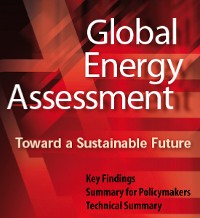19 October 2012
Global Energy Assessment available online October 20th
The Global Energy Assessment (GEA) is the first fully integrated assessment of the global energy system to date, involving 300 authors and 200 reviewers worldwide, including scientists, policy experts, and industry leaders. GEA examines the global challenges related to energy, as well as opportunities and strategies for developing, industrialized, developing and emerging economies. It also presents a suite of pathways and potential solutions, and their costs and benefits for society and the environment. The report was launched at Rio+20 in June 2012 and the print version was published by Cambridge University Press in September.
The challenges
GEA analysts examined major global challenges and their relationships to energy. For example, currently 1.4 billion people worldwide have no access to electricity, and 3 billion people still rely on solid fuels for cooking. The GEA estimated that in 2005, total outdoor air pollution accounted for 2.7 million deaths, while indoor pollution from burning fuels contributed to 2.2 million deaths, mainly among women, the elderly and children. Providing access to modern forms of energy is an essential step towards poverty eradication and improvements in human health.
While limiting climate warming to less than 2°C above pre-industrial levels is one of the main GEA goals, authors explored the interconnected systems related to energy systems such as health, water, transportation, buildings, land-use, and forestry.
Energy systems place pressure on the global and local environment – for example with the threats of oil spills, freshwater contamination and overuse, and releases of radioactive substances. Finally, many countries currently rely on imported fossil fuels for a majority of their energy supply, making them vulnerable to energy security issues.
Toward a sustainable future
GEA analysis shows that to meet the sustainability goals, an immediate and major transformation of energy systems is required. The report draws on integrated assessment and energy system models developed at IIASA and other institutions to identify and evaluate the energy resources and technological options available to drive this transformation toward sustainable energy systems. Using these options, the researchers explored 60 alternative energy transformation pathways, finding that 41 can simultaneously provide solutions to sustainability challenges. This requires radical energy efficiency improvements, and decarbonization through greater renewable energy shares and smart grids.
These pathways would also bring other multiple benefits in terms of economic growth, energy security, environmental benefits, and more. Since energy ties into many other sectors, changes to the energy system would have impacts far beyond energy production and use. GEA analysis indicates that global investments in energy systems needs to increase to US$1.7-2.2 trillion, compared to present investments of $1.3 trillion.
A number of dissemination events are planned in the next few months to discuss the GEA findings, particularly at the regional and national level. For a full list of events, see the GEA Web page (www.globalenenergyassessment.org).


